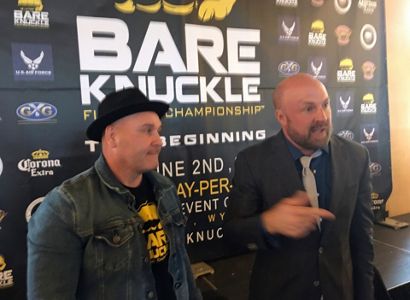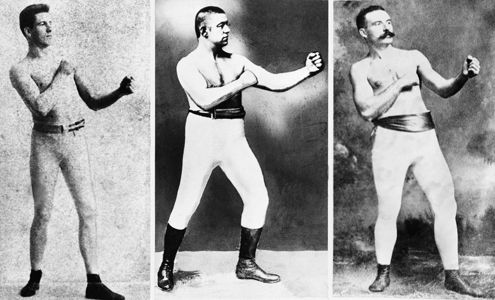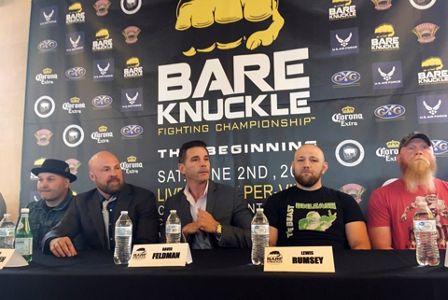CHEYENNE, Wyo. (AP) — In 1889, the great John L. Sullivan, the Boston Strong Boy, beat Jake Kilrain in 75 rounds — yes, 75 — in what the International Boxing Hall of Fame has called the "last significant bare-knuckle bout in boxing."
Since then, about the only gloves-off fighting many people have witnessed has consisted of barroom brawls.
But on Saturday night, 10 bouts of bare-knuckle boxing, including one involving female fighters, will take place at the Cheyenne Ice and Events Center.
The event, available on pay-per-view, is being promoted as the first legal, regulated and sanctioned bare-knuckle fight event in U.S. history. Back in Sullivan's day, there were no sanctioning bodies and few if any regulations.
"I think it's what the public wants to see. The public is begging for something new," promoter David Feldman said, noting that it has been 25 years since the advent of UFC mixed martial arts. "We're hopefully leading the way to a new era in combat sports."
The boxers will be allowed wraps around their thumbs and wrists but will not wear any protection over their knuckles the way fighters normally do in traditional boxing, MMA or other combat sports where padded gloves of various thickness are used.
Each bout is scheduled for five, 2-minute rounds, fought in a ring with rounded ropes instead of the traditional square.
Bare-knuckle regulations are otherwise similar to those of glove boxing, in that opponents can only throw punches and there's a standing eight count and a three-knockdown rule.
"But when you're in a clinch, you can hit with the open hand. You can pull the back of their neck into punches," Feldman said. "So it gives a little bit more excitement in the clinches."
ESPN boxing columnist Nigel Collins said gloves — originally known as mufflers — were introduced around the 18th century to help protect fighters' hands and the faces and hands of aristocrats who took up the sport. By the turn of the 20th century all boxing matches had gloves because new rules required them, Collins said.
Some authorities on boxing have argued that padded gloves made the sport more dangerous by allowing fighters to hit their opponents in the head more often with less risk of hurting their hands.
Collins said he personally isn't interested in bare-knuckle fighting "but I wouldn't knock it. If that's what people want to do, let them do it." He said it would be hypocritical of fans of boxing and other martial arts to object to the danger and brutality.
Feldman's Bare Knuckle Fighting Championships organization has been trying to get bare-knuckle boxing sanctioned in a number of states. The Wyoming State Board of Mixed Martial Arts, created in 2012, was the first to do so.
Board chairman Bryan Pedersen said the board received no opposition and saw the event as an opportunity to provide better safety than is afforded at unregulated bare-knuckle fights. Ringside doctors, for instance, are required at state-sanctioned bouts.
The board reviewed research that indicated bare-knuckle boxing would be safer than other combat sports, especially when it comes to concussions, Pedersen said.
"If you look at what we already regulate in the state of Wyoming — we regulate kickboxing and MMA, right?" he said. "In those two, you could take an elbow to the head, a knee to the head or a shin kick to the head. And go out in your yard and punch a basketball and kick a basketball and see what goes farther."
Collins said whether bare-knuckle boxing is safer than regular boxing isn't known. He only knows that the bare-knuckle fights being held in Wyoming won't be nearly as brutal as the bouts in the old days, when fighters slugged it out until one couldn't continue.
Fighter Bobby Gunn, who is on the card Saturday night, said Wyoming is bringing a sport that exists underground into the light of day.
"I don't got to worry about being arrested," Gunn said with a laugh.
Pedersen sees advantages for the state of Wyoming as well: "I see the whole thing as a giant economic possibility for diversity in our state and to really help promote the Cowboy State and our strong sense of Western independence."
Ricco Rodriguez, a former UFC champion who is making his first try at bare-knuckle boxing on Saturday, said it seems safer to him than gloved fighting because the athletes know they have to be more careful not to injure their hands.
"You hit an elbow or you hit the back of the head or something, you're liable to definitely break your hand," Rodriguez said.
Rodriguez's training for Saturday included conditioning his hands by punching wood dummies and doing pushups on his knuckles.
He said he likes the idea of being involved in building a new combat sport. Also, he said, "I think it's the purest form of fighting."
Feldman said that when people first hear about bare-knuckle returning as a sport, it always draws a reaction.
"Because of that reaction, we're going to shock the world Saturday night," he said.
Copyright 2018 The Associated Press. All rights reserved. This material may not be published, broadcast, rewritten or redistributed.






